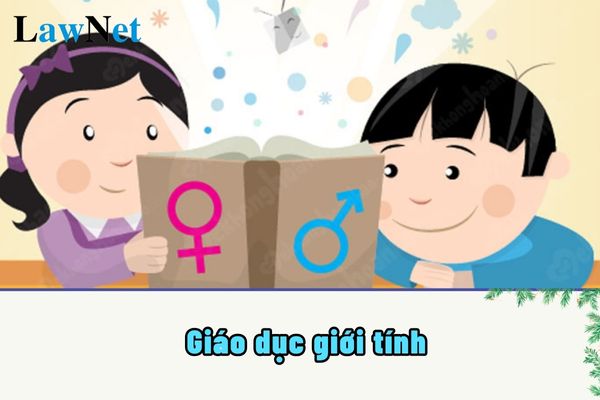What are regulations on sexual education according to the law in Vietnam?
What are regulations on sexual education according to the law in Vietnam?
Currently, sexual education does not have a standalone subject but is integrated into smaller programs, typically within the 5th grade science subject. It wasn't until the 2018 General Education Curriculum that it was discussed in more depth.
The content of sexual education is integrated into the curriculum of Natural and Social Sciences from grades 1, 2, 3, and the science curriculum of grades 4 and 5.
Moreover, sexual education is the process of teaching and learning with the objective of equipping children and adolescents with the necessary knowledge, skills, attitudes, and values about themselves.
From this, children can build social relationships and sexual relationships based on mutual respect.
Sexual education for children and adolescents does not stop at providing knowledge about the body, reproductive system, conception mechanisms, contraceptive measures, prevention of sexually transmitted diseases, or simple knowledge about human sexual activities. Besides knowledge, children and adolescents need to be educated and guided on their attitudes towards gender and sexuality issues.
What are regulations on integration of sex education into the curriculum for primary school children in Vietnam?
Based on Official Dispatch 850/BGDDT-GDTH in 2022 regarding sexual education in the compulsory primary school curriculum, the Ministry of Education and Training (MOET) mentions as follows:
According to the primary school general education curriculum issued under Decision 16/QD-BGDDT in 2006 by the Minister of MOET (no longer effective and replaced by Circular 32/2018/TT-BGDDT), sexual education is included in the curriculum and essential requirements of the program and the 5th grade science textbook as stipulated in the Appendix of the science subject of the general education curriculum issued along with Circular 32/2018/TT-BGDDT (amended by Articles 1 and 2 of Circular 13/2022/TT-BGDDT).
Additionally, through several guidelines on program implementation and textbooks, reducing load, and implementing knowledge and skills standards, the content of sexual education has always been raised and guided in detail.
According to the 2018 General Education Curriculum issued under Circular 32/2018/TT-BGDDT on December 26, 2018, the content of sexual education is included in the curriculum of Natural and Social Sciences from grades 1, 2, 3 and in the Science curriculum of grades 4 and 5 as stipulated in the Appendix of the science subject curriculum issued along with Circular 32/2018/TT-BGDDT (Amended by Articles 1 and 2 of Circular 13/2022/TT-BGDDT).
Subjects such as preventive measures against abuse, among others, are also included in the content of other subjects like Ethics and Experiential Activities from grade 1.
Thus, sexual education content in the formal and compulsory curriculum of primary school grades ensures compatibility with the psychological development of the students.
Currently, the MOET is developing a new preschool education program. The MOET appreciates the feedback from voters and continues to research to incorporate sexual education into the content of the new preschool education program in a manner appropriate for preschool children's psychology and physiology.
>>> Download Natural and Social Sciences curriculum for grades 1, 2, and 3
>>> Download Science curriculum for grades 4 and 5
>>> Download General experiential activities curriculum
(The general education curriculum has some contents amended by Articles 1 and 2 of Circular 13/2022/TT-BGDDT).

What are regulations on sexual education according to the law in Vietnam? (Image from the Internet)
What are regulations on assessment of the results of science education at the primary level in Vietnam?
Based on Section VII of the Appendix of the science subject curriculum issued along with Circular 32/2018/TT-BGDDT, the assessment details are as follows:
The assessment of science education results is conducted under the general orientation mentioned in the overall program, ensuring the following requirements:
[1] The objective of the assessment is to provide accurate, timely, and valuable information about the level of meeting the required achievements of the science subject curriculum and the progress of students to guide learning activities and adjust teaching activities and management activities;
Encouraging students to utilize their strengths, diligently study, explore, and discover issues related to the science subject.
[2] The basis of the assessment is the required achievements concerning qualities and abilities specified in the overall program and the subject curriculum. Besides assessing knowledge and skills, appropriate measures should be reinforced and applied to assess students' attitudes in learning;
Focusing on evaluating the ability to apply knowledge and skills in different learning situations.
[3] Combining formative assessment and summative assessment; qualitative and quantitative assessment; teacher assessment with self-assessment, and peer assessment by students, as well as the evaluation by students' parents and the community.
Formative assessment occurs throughout the learning process of the students. Teachers use various tools such as questions, exercises, observation forms, practical assignments, learning projects, products, and more. Formative assessment involves teachers, students, students' parents, and the community.
Summative assessment is conducted to determine the level of students' achievement of the science subject curriculum goals after a period of learning. The results of the summative assessment are recorded in numerical scores along with teachers' comments.
[4] Utilizing different assessment methods and tools, such as evaluating through oral responses, written work (essays, objective tests, field trip reports, research collection reports, etc.); evaluation through observation (observing students performing practical tasks, group discussions, field trips, etc. using observation charts, checklists, learning portfolios, etc.); evaluation through students' practical products; and more.

